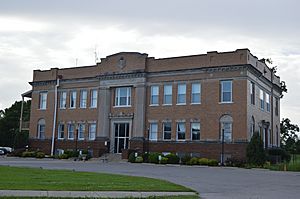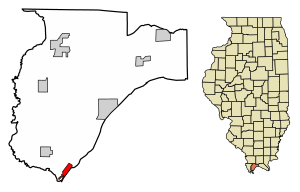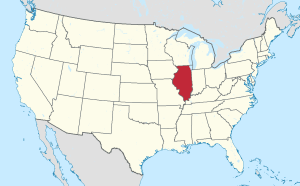Mound City, Illinois facts for kids
Quick facts for kids
Mound City
|
|
|---|---|

Pulaski County Courthouse
|
|

Location of Mound City in Pulaski County, Illinois
|
|

Location of Illinois in the United States
|
|
| Country | United States |
| State | Illinois |
| County | Pulaski |
| Area | |
| • Total | 0.74 sq mi (1.91 km2) |
| • Land | 0.68 sq mi (1.75 km2) |
| • Water | 0.06 sq mi (0.16 km2) |
| Elevation | 322 ft (98 m) |
| Population
(2020)
|
|
| • Total | 526 |
| • Density | 779.26/sq mi (300.75/km2) |
| Time zone | UTC-6 (CST) |
| • Summer (DST) | UTC-5 (CDT) |
| ZIP Code(s) |
62963
|
| Area code(s) | 618 |
| FIPS code | 17-50751 |
| GNIS feature ID | 2395112 |
| Wikimedia Commons | Mound City, Illinois |
Mound City is a city in Pulaski County, Illinois, United States. It is also the county seat, which means it's where the county government is located. The city is found along the Ohio River, a large river that flows into the Mississippi River nearby. In 2010, about 588 people lived there.
Contents
History of Mound City
Mound City was officially created in 1857. It was formed by joining two smaller towns: Mound City, started by Major General Moses Marshal Rawlings, and Emporium City. Emporium City was a plan by business people from Cincinnati and Cairo.
The city got its name from a special Native American mound. This mound was a raised area of earth. Guests at General Rawlings' hotel would sleep on it during summer nights. The breezes on the mound helped keep them cool and kept mosquitoes away.
Mound City During the Civil War
During the Civil War, Admiral Andrew Hull Foote set up a naval base in Cairo. This base was for the Mississippi River Squadron, a fleet of over 200 ships. These ships included ironclads (ships covered in iron armor), hospital ships, and transport vessels.
Cairo didn't have enough land for all the naval facilities. So, many repair shops were on boats. In 1862, the naval station moved to Mound City. The navy bought 10 acres of land there. The Mound City Naval Station had a shipyard, a foundry (for making metal parts), barracks for soldiers, supply offices, and a hospital. However, some repair facilities stayed on boats because Mound City often flooded.
The USS Cairo Gunboat
The USS Cairo was a special ironclad gunboat. It was built in 1861 by James Eads and Co. in Mound City. The ship was made for the Union Navy during the Civil War. It was named after Cairo, Illinois.
In January 1862, the USS Cairo joined the Mississippi River Squadron. Its job was to destroy Confederate batteries and clear mines from the Yazoo River. On December 12, 1862, near Vicksburg, Mississippi, the USS Cairo was sunk. It was the first ship ever sunk by electrically detonated torpedoes.
Recent Leadership in Mound City
In 2017, Allison Madison was elected mayor of Mound City. She made history as the city's first African-American mayor and its first female mayor.
Geography of Mound City
Mound City is located at 37°5′8″N 89°9′47″W / 37.08556°N 89.16306°W.
According to the 2010 census, Mound City covers about 0.729 square miles (1.91 square kilometers). Most of this area, about 0.67 square miles (1.75 square kilometers), is land. The rest, about 0.059 square miles (0.16 square kilometers), is water.
Most of the Native American mounds that gave the city its name are no longer there. They were destroyed as the city grew and land was used for farming.
Population and People
The population of Mound City has changed over the years. Here's a look at how many people have lived there during different census counts:
| Historical population | |||
|---|---|---|---|
| Census | Pop. | %± | |
| 1860 | 898 | — | |
| 1870 | 1,631 | 81.6% | |
| 1900 | 2,705 | — | |
| 1910 | 2,837 | 4.9% | |
| 1920 | 2,756 | −2.9% | |
| 1930 | 2,548 | −7.5% | |
| 1940 | 2,465 | −3.3% | |
| 1950 | 2,167 | −12.1% | |
| 1960 | 1,669 | −23.0% | |
| 1970 | 1,177 | −29.5% | |
| 1980 | 1,102 | −6.4% | |
| 1990 | 765 | −30.6% | |
| 2000 | 692 | −9.5% | |
| 2010 | 588 | −15.0% | |
| 2020 | 526 | −10.5% | |
| U.S. Decennial Census | |||
Population Makeup in 2020
The 2020 census shows the different groups of people living in Mound City. This table looks at race and ethnicity. Note: Hispanic/Latino is an ethnic group and can include people of any race.
| Race / Ethnicity (NH = Non-Hispanic) | Pop 2010 | Pop 2020 | % 2010 | % 2020 |
|---|---|---|---|---|
| White alone (NH) | 256 | 193 | 43.54% | 36.69% |
| Black or African American alone (NH) | 314 | 295 | 53.40% | 56.08% |
| Native American or Alaska Native alone (NH) | 1 | 2 | 0.17% | 0.38% |
| Asian alone (NH) | 1 | 0 | 0.17% | 0.00% |
| Pacific Islander alone (NH) | 0 | 0 | 0.00% | 0.00% |
| Some Other Race alone (NH) | 2 | 6 | 0.34% | 1.14% |
| Mixed Race or Multi-Racial (NH) | 5 | 26 | 0.85% | 4.94% |
| Hispanic or Latino (any race) | 9 | 4 | 1.53% | 0.76% |
| Total | 588 | 526 | 100.00% | 100.00% |
Population Makeup in 2010
In the 2010 census, there were 588 people living in Mound City. These people made up 270 households.
- About 44.39% of the people were White.
- About 53.4% were African American.
- There was one Asian person.
- Three people were from other races.
- Eight people were from two or more races.
- Nine people were Hispanic or Latino (this group can be of any race).
Notable People from Mound City
- Charlie Hoover, a baseball catcher who played for the Kansas City Cowboys.
- Katherine D. Tillman, a well-known writer.
Historic Places in Mound City
Two places in Mound City are listed on the National Register of Historic Places. This means they are important historical sites.
Images for kids
See also
 In Spanish: Mound City (Illinois) para niños
In Spanish: Mound City (Illinois) para niños




